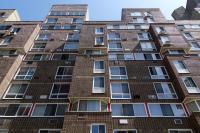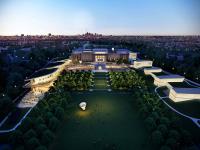Yingtai Campus
Shenzhen, China
Superimpose was invited to participate in the competition for a mixed-use masterplan for a former factory area in Long Hua, Shenzhen. The project is set to become an ‘industrial landmark’ and the vast majority of the area in this mixed-use development will be industrial, office and R&D related. However the development will also integrate supporting retail, a residential area, dormitories for the factory workers, sports facilities, a kindergarten, and parks. The masterplan will be a transit-oriented development (TOD), connecting to a subway station and intercity bus station.
Superimpose proposed a ‘campus’ concept by pushing the higher buildings to the periphery of the sites and placing lower buildings at the site’s axis to establish a centralized human-scale public space with connectivity over multiple levels ultimately creating an inspirational environment for working and living.
The lower volumes at the axis of the site create a comfortable public ‘campus’ realm within the high-density development and locate functions such as R&D display units, retail pavilions, sports facilities and are surrounding by a network of sunken courtyards, bridges, terraces and greenery.
The tower volumes are segmented in 3 different distinct zones, the base, the middle and the top, providing three efficient floorplates to different types of tenants. The base of the stepping tower has the largest and deepest floor plate allowing for a factory usage. The middle zone has a less deep floor plate suitable for R&D companies, still big enough to allow for larger equipment and laboratories. The top of the tower is designed as a standard grade A office floor plate with a central core.
The massing variation of the stepping towers gives opportunity for green terraces on different levels. These lush terraces promote healthy working environment for its users. The concept of sponge city and systematic filtration of water can also be realized within these green pocket spaces.
The project is designed with the TOD concept in mind. Every plot connects seamlessly to the subway and bus station with a 24-hour ‘5 minute living circle’ loop. On-site car circulation is minimized by strategically locating drop-off pockets and car ramps close to the periphery roads. The car-free centralized pedestrianized zone creates a friendly public realm.
The design aims to maximize passive design strategies and deliver a comfortable external environment. The development integrates holistic design strategies, which balance a wide range of social, economic and environmental objectives. With this strategy the design responds to the client aspirations for the project to be local with global aspirations. In overall the design maintains a visual simplicity and unity with a clear sophistication in details creating a bold and powerful vision for the Yingtai Wisdom Campus.
- Architects
- Superimpose Architecture
- Location
- Shenzhen, China
- Team
- Carolyn Leung, Ben de Lange, Ruben Bergambagt, Ana Raluca Timisescu, Xiaoyu Xu, Inci Lize Ogun, Rafaela Sampaio Agapito Fernades













